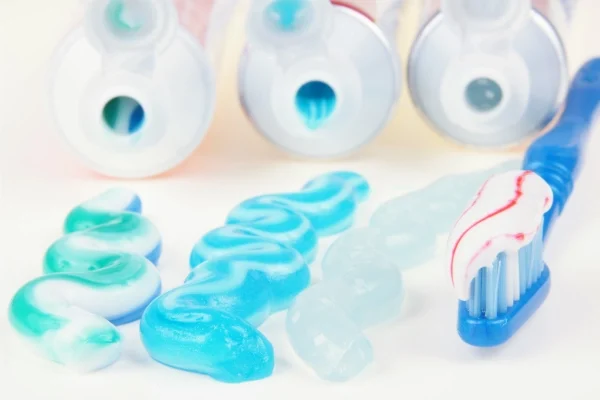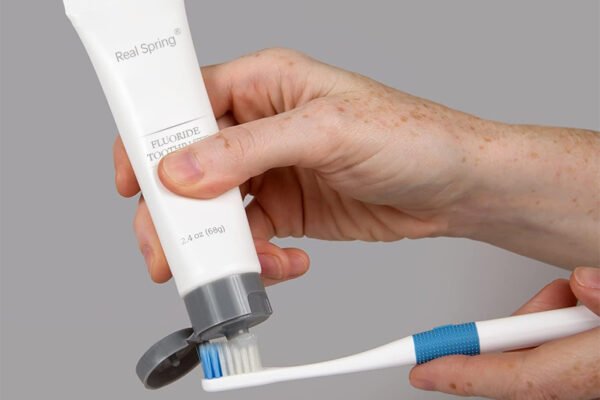As a natural remedy for health issues, propolis is not a modern discovery. Its use in oral care is centuries old and originated in ancient civilizations. Today, many oral products incorporate propolis as an ingredient due to its therapeutic properties.
However, little literature is available on the use of propolis in mouthwash. So, you may wonder, does propolis mouthwash work, and what are the key benefits of using it?
Read to learn more about this fantastic natural product from bees. We will explain its origin, efficacy, types of propolis mouthwash, and how to use it.
What Is Propolis ?
Propolis is a greenish-brown resinous substance that bees use to protect a hive’s health. It’s a waxy compound of natural substances like plant sap and beeswax. The bee glue (propolis) seals the hive against intruders, bacteria, fungus, and other physical elements.
In general, propolis consists of:
- Plant resin: 50%
- Beeswax: 30%
- Pollen: 5%
- Essential and aromatic oils: 10%
Propolis also contains flavonoids, which are a type of antioxidant.
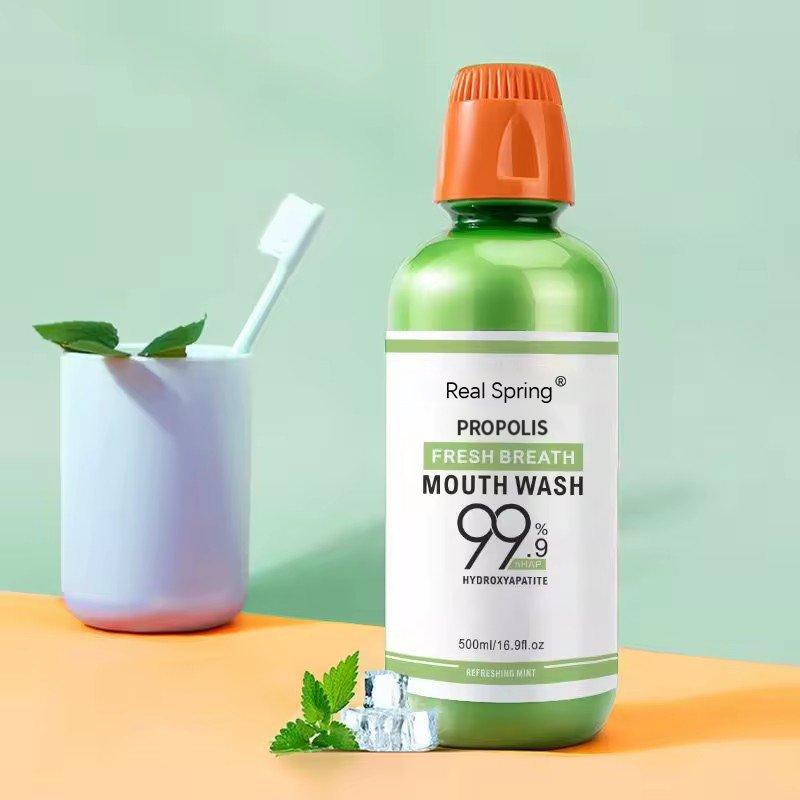
The Origins of Propolis Use
Ancient Greeks used propolis as a mouthwash, and Romans utilized bee glue as an antiseptic. In WWI and WWII, the resin-like substance was used as a topical for its wound-healing properties. The Soviets included propolis in first aid kits to help with infection and healing.
Since its use in ancient times, propolis has continued to show some health benefits for humans. Potential benefits of propolis include
- Promoting oral health
- Helping heal minor wounds
- Treating cold sores
- Aiding inflammation
A 2019 review suggests that propolis composition may have the following medicinal properties:
- Antibacterial
- Antifungal
- Anti-inflammatory
- Antioxidant
- Antiviral
- Antiprotozoal (capability of working against parasitic illness)
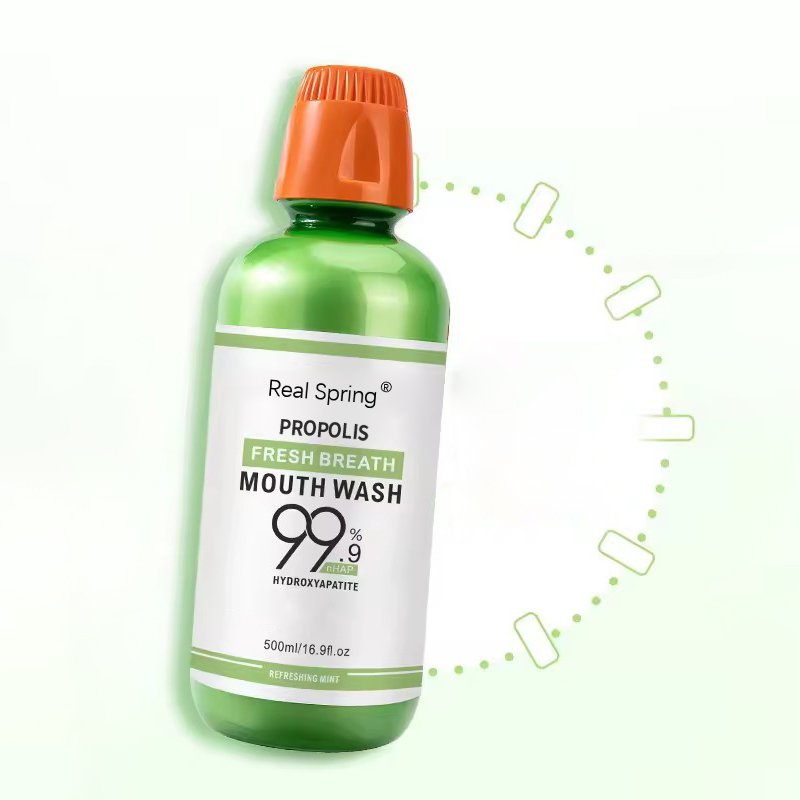
Key Health Benefits of Propolis
Helps Fight Cavities
Propolis is known for its antimicrobial and antiseptic properties. It is the quality that helps kill bacteria, making plaque formation difficult. Propolis also reduces the bacteria that cause cavities.
Promotes Healing
You can use propolis mouthwash after oral surgery to promote healing. In oral health, propolis application on the gums reduces pain and swelling, speeding up recovery. Propolis also helps stimulate collagen production in the skin, which supports wound healing.
Keeps Gums and Lips Healthy
A mouthwash with Propolis helps to reduce inflammation of the gums and lips. Propolis reduces bacterial buildup, which results in plaque that causes inflammation. The antioxidants in propolis also help to reduce inflammation.
Help with Tooth Sensitivity
Thinning of the enamel and loose gums causes irritants such as hot or cold temperatures to pass through the dentin, causing teeth to become sensitive. Propolis helps to seal your enamel and dentin, reducing exposure of the sensitive tiny tubules.

How Propolis Supports Healthy Gums and Teeth
Bee propolis has anti-cariogenic properties. Its use in preventive dentistry helps reduce the incidence of caries and accumulation of dental plaque. The flavonoids and terpenoids in Propolis have shown strong antimicrobial properties.
The fatty acids in propolis provide a cariostatic effect and decrease acid production. Propolis rinses are popular as a preventative product in oral care compared to chlorhexidine (CHX) rinses or ones that contain alcohol or other carriers.
Propolis is beneficial for oral health in different ways. Its biocompatibility and antimicrobial properties make it effective as an intracanal medication in endodontic treatments.
Some propolis mouthwash reviews demonstrate antibacterial, anti-inflammatory, and healing activity in periodontitis treatment.
There are various ways of using propolis in the treatment of periodontitis.
Targeting Oral Issues Naturally
Propolis has natural anti-inflammatory capability. A mouthwash with propolis helps reduce gum inflammation and soothes oral ulcers naturally.
Products like propolis, fresh fruit mouthwash, and propolis fruity mouthwash will help fight plaque. As an ingredient, propolis fights plaque-building bacteria and reduces plaque formation.
Probiotic and Antiseptic Properties
Propolis has probiotic and antiseptic properties that target specific oral issues. Several propolis mouthwashes aim to target the therapeutic traits of bee glue. They include:
- Probiotic propolis mouthwash: It can effectively control the growth of bacteria in the oral cavity. This action prevents oral diseases and cares for the health of your teeth.
- Propolis antiseptic mouthwash: An oral care product capable of cleaning and maintaining oral health when rinsing your mouth. It is suitable for all ages, sensitive teeth, bad breath, and periodontal problems.
Propolis Mouthwash and Oral Health Conditions
Propolis mouthwash offers a natural and mild alternative to oral hygiene products. It also allows you to reap the therapeutic benefits of propolis.
Although propolis has many benefits in oral care, we do not recommend it as the sole treatment for tooth infection. If you have a tooth infection, consult your dentist to find the underlying issue and the proper treatment. Propolis will help speed up the healing of oral ulcers in combination with other therapies.
However, you can use propolis mouthwash for routine dental cleaning. Propolis in oral care is most effective in preventive care. So, we recommend using propolis mouthwash for preventive care and as per your dentist’s directions.
Daily use of propolis mouthwash in your oral hygiene will go a long way in ensuring healthy teeth and gums. Before using a new product, always consult with your healthcare provider. If you experience adverse effects, you should stop and seek medical advice.
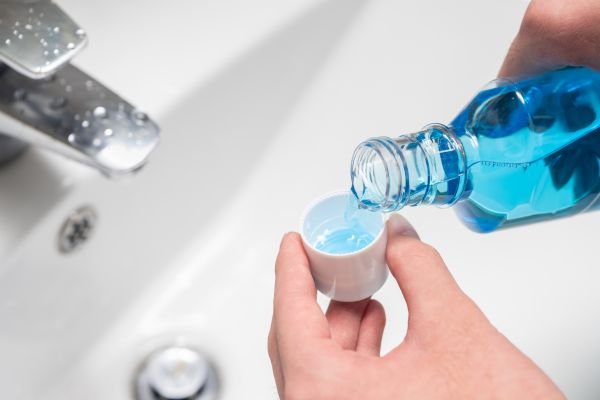
Types of Propolis Mouthwash Products Available
There are different types of propolis mouthwash products on the market. Their difference depends on the ingredients used.
Fruity, Antiseptic, and Probiotic Variants
Here are the differences between propolis mouthwash products:
- Propolis and citrus mouthwash: Citrus mouthwash uses citrus as the main active ingredient.
- Propolis fruity mouthwash: It contains artificial fruit flavors.
- Propolis fresh fruit mouthwash: A propolis mouthwash that uses fresh fruit extracts to create flavors.
Other Propolis-Based Oral Products
Propolis use in dental care products is not only to mouthwash alone. Other oral products that use Propolis as an ingredient are:
- Propolis toothpaste
- Propolis gum
- Propolis lip
- Propolis jelly
- Propolis nasal spray mold
Step 1
Measure the proper amount of mouthwash, usually 10-15 ml.
Step 2
Put the mouthwash in your mouth. To ensure a complete propolis rinse, gargle several times, moving the contents from left to right, front and back, and on the tongue.
You should gargle for 30 seconds to 1 minute, ensuring the mouthwash covers all corners, including the crevices inside your mouth.
Step 3
Spit out the mouthwash, being careful not to swallow it. To clear the taste, rinse your mouth with water while spitting out.
However, you can refrain from drinking water or eating for the next 30 minutes after gargling to allow the formation of a protective film and maintain fresh breath.
If you are using a DIY propolis tincture, follow the following instructions.
- Pour 10-15 drops of propolis tincture into a ½ cup of water
- Mix the Propolis with water
- Put the mixture in your mouth and gargle it as explained above.
- Spit the contents out and rinse with clean water if desired
- Repeat daily for best results
Recommended Dosage and Frequency
The amount to use relates to your propolis mouthwash dosage information. The above user guide is based on the average dosage of propolis 500 mg.
Mouthwash usage frequency varies from person to person. You can use it after meals or after brushing. If you experience any discomfort during or after use, stop using immediately and consult your healthcare provider.
Who Should Avoid Using Propolis Mouthwash?
Some people may have an intolerance to Propolis. It stems from an allergic reaction to a certain proportion of bee pollen. Avoid using propolis mouthwash if you are allergic to bee products and bee stings.
How to Test if You Are Allergic to Propolis
Apply a small portion of Propolis to the inside of an arm. If a reaction occurs after a few hours, you should not use the propolis mouthwash and its other products.
Does Propolis Mouthwash Work?
Scientific Evidence and Reviews
Some propolis reviews show potential for propolis mouthwash in oral care and health.
Many propolis reviews show the therapeutic potential of using bee glue in mouthwash. Propolis has many benefits for oral health, and using the product in your daily routine dental care will help mitigate against oral health issues.
User Testimonials and Experiences
Customers using bee propolis mouthwash say the product improves their oral health. One outcome our customers have experienced is reduced gum bleeding.
Others say a mouthwash with propolis is mild and leaves them with a fresher breath.

Conclusion
Incorporating propolis mouthwash into your oral care routine provides an effective, natural way to protect against gum disease, dental caries, and inflammation. As research continues to reveal more benefits of Propolis, adding it to your oral hygiene routine may be one of the best decisions you make for long-term oral health.
Propolis is a natural solution that is effective for oral care. It is an ingredient in many other oral care products, including toothpaste, floss, gum, propolis lip balm, jelly, and nasal spray mold. However, you must consult your healthcare provider before using any new product to confirm eligibility.
Explore our website to learn more about our varieties of propolis mouthwash. You can also contact us for further information and learn how to make your own private-label propolis mouthwash.
FAQ
What are the key benefits of Propolis Mouthwash for oral health?
How does Propolis Mouthwash compare to traditional mouthwashes in terms of efficacy?
What are the primary ingredients in Propolis Mouthwash?
- The main ingredients include propolis extract, which is rich in flavonoids and other bioactive compounds, essential oils, and natural flavorings. Some variants may also contain citrus or fresh fruit extracts.




